Huizhou merchants gathered by the Huangpu River to jointly draw a blueprint for the distant ocean. In August, the banks of the Huangpu River are bustling with activity, and the innovative forces of the Yangtze River Delta have been surging here recently. Recently, the 2025 Yangtze River Delta Hui Shang Construction Industry Development Conference with the theme of "Hui Shang More 'Heart'·Leading the Way Overseas" was successfully held in Shanghai. This conference brought together over 300 political, business and academic elites from all over the Yangtze River Delta region, aiming to pool the strength of the construction industry in the Yangtze River Delta, jointly explore new paths for the upgrading and international development of the construction industry, and jointly draw a blueprint for high-quality development during the period of deep transformation of the construction industry. As an important participant and promoter in the internationalization process of the industry, Feng Yu, the head of the International Business Department of Jianjing Investment Consulting Co., LTD. (hereinafter referred to as "Jianjing Consulting"), delivered a keynote speech titled "Internationalization of Construction Enterprises - Smart Vision for the Future" at the conference, providing systematic strategic guidance for construction enterprises to go global.
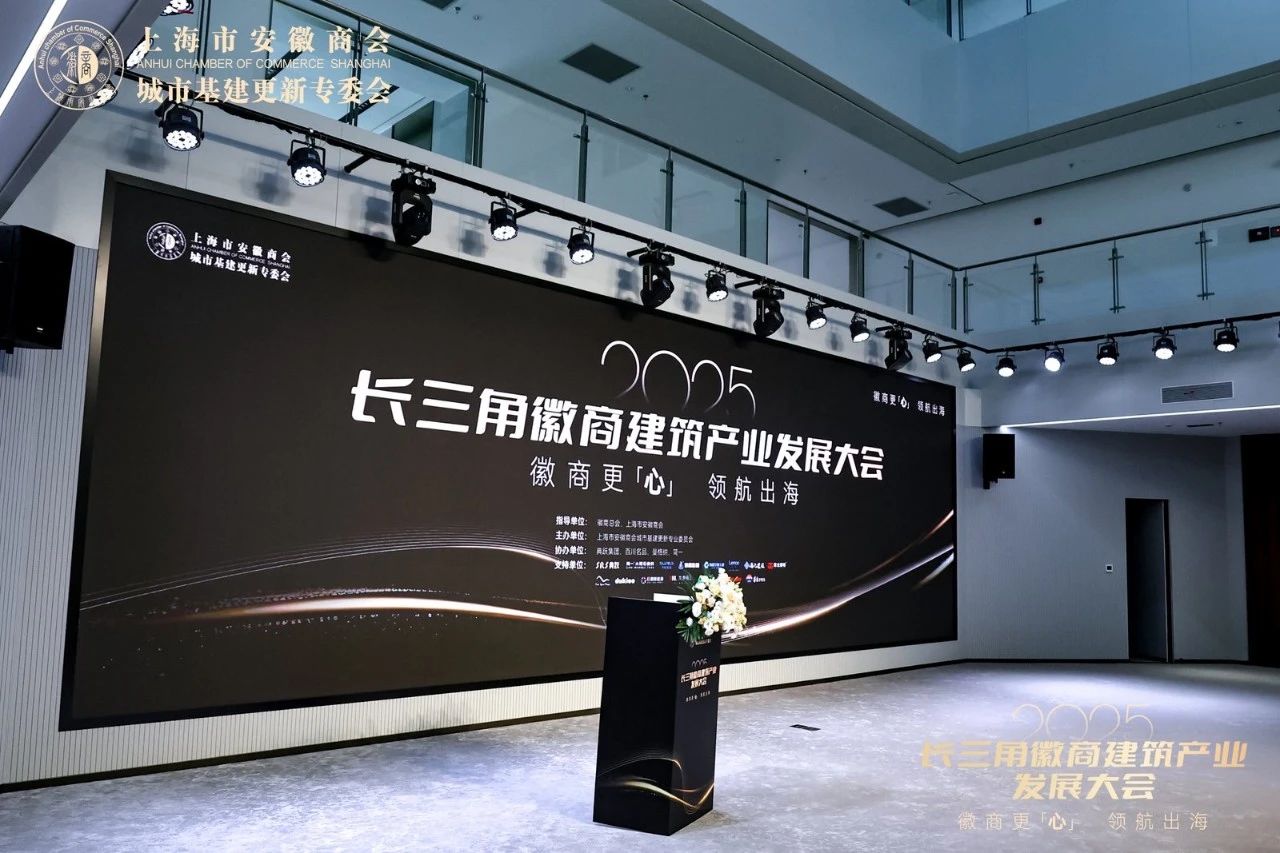
1. Opening Remarks: Political, business and academic circles discuss the development direction of the industry
At the opening ceremony of the conference, leaders from all walks of life shared their insights from the forefront of the industry. Many representatives from chambers of commerce and enterprises pointed out that the infrastructure renewal industry, represented by construction, is an important intersection of the construction of a strong country and the well-being of the people, and the construction industry has entered a new stage of high-quality development. Enterprises should take innovation as the engine, increase investment in intelligent manufacturing and green construction, strengthen industrial chain collaboration, and contribute to the development of the industry and the country. It was also mentioned that in the current industry transformation, "urban renewal" and "market reshuffling" are two key battles. Enterprises should focus on high-quality and green low-carbon demands, and practitioners should unite and help each other, focusing on the domestic market while looking to the global market. Only by deeply integrating local advantages with an international perspective can we gain a firm foothold in the fierce industry competition, jointly promote the qualitative leap of the construction industry in the era of transformation, and contribute Chinese wisdom and strength to the global infrastructure development.
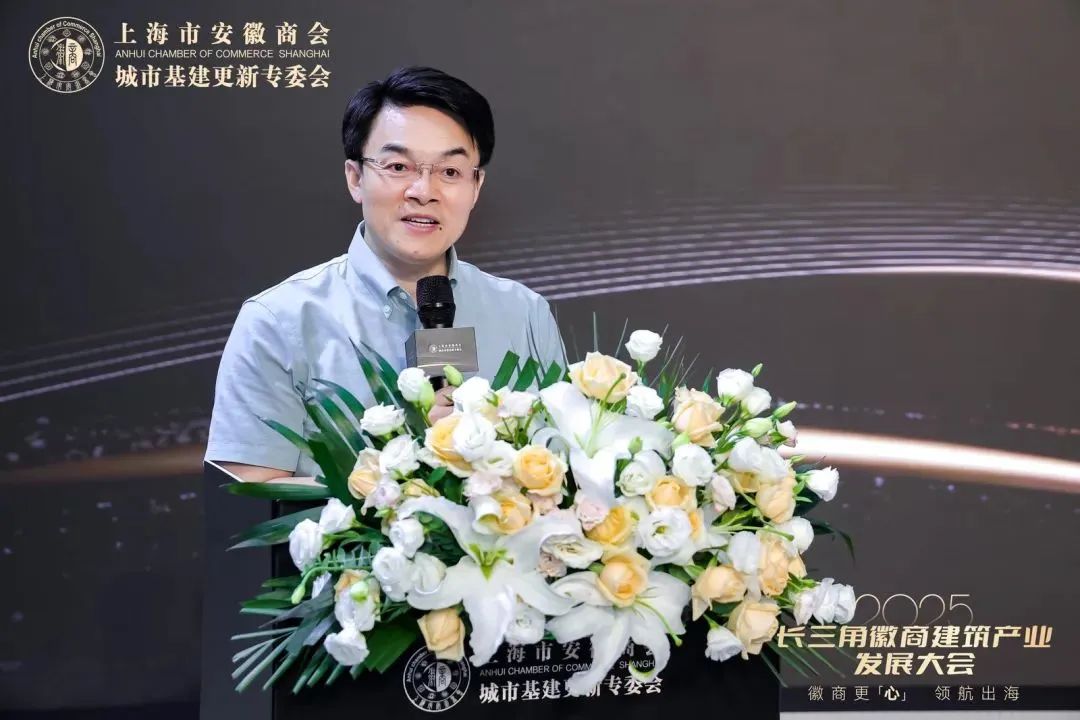
2. Theme Sharing: Jianjing Consulting Analyzes the Internationalization Path of Construction Enterprises
During the theme sharing session of the conference, Feng Yu, the head of the International Business Department of Jianjing Consulting, delivered a keynote speech titled "Internationalization of Construction Enterprises - Insights into the Future". Relying on the company's 22 years of professional accumulation in the industry and over 1,400 practical experiences in foreign aid projects, she systematically analyzed the paths and methods for the internationalization of construction enterprises from the international situation, market layout, breakthrough strategies, risk management to empowering the ecosystem, providing a practical action framework for the industry.
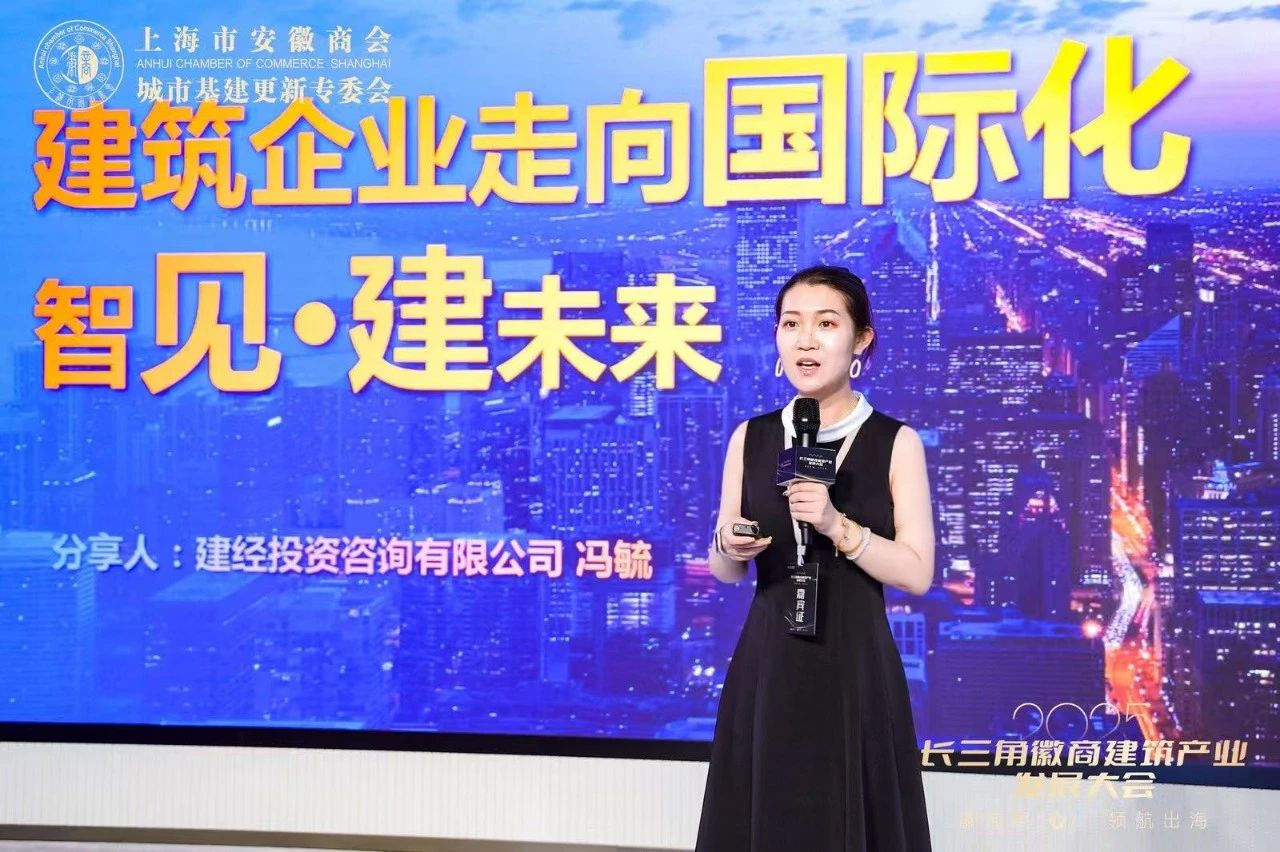
(1) International situation: Going global is inevitable amid uncertainties
The current global economy is undergoing profound changes. For construction enterprises, "going global" is not only an inevitable choice to cope with domestic transformation but also a strategic measure to seize global opportunities. From an international perspective, the world economy is confronted with multiple uncertainties: fluctuations in the policy direction of the United States, the ongoing geopolitical conflicts such as the Ukraine crisis and the Israeli-Palestinian conflict, have intensified the pressure on global supply chain adjustments, and the European economy has shown a clear downward trend due to the drag of the conflicts. However, at the same time, the digital economy and sustainable development have given rise to new growth poles, and the demand for infrastructure in emerging markets is strong, providing a broad space for Chinese construction enterprises. From the current domestic situation, the construction industry has entered a stage of in-depth cultivation of existing resources. Problems such as intensified homogeneous competition and insufficient innovation momentum have become prominent, and the growth bottleneck of the domestic market urgently needs to be broken through. Against this backdrop, "going global" has become the key for enterprises to break through the predicament - not only can it open up incremental markets, but it can also absorb international innovative energy by participating in global competition and feed back to the upgrading of domestic industries. Feng Yu pointed out that the internationalization of construction enterprises has changed from an "optional question" to a "compulsory course", and it is the core path for China to move from a "major infrastructure country" to a "powerful infrastructure country".
(2) Global Market: Graded Analysis and Potential Layout
The core of internationalization for construction enterprises lies in "precise layout". Based on years of practice, Feng Yu proposed the concept of the "Global Market Three-Dimensional Evaluation Model", providing enterprises with a market analysis framework from three dimensions: economy, competition, and policy, and clearly defined the opportunities and strategies in four key regions.
Economic dimension: Focus on the growth rate of infrastructure investment. Due to the accelerated urbanization, the growth rate of infrastructure investment in Southeast Asia has exceeded 6%, far higher than the 2% level in Europe and America. The demand in transportation, energy, communication and other fields is strong, making it the most promising market at present.
Competition dimension: Focus on the penetration rate of international brands. Although the Middle East market is dominated by European and American enterprises, the local construction capacity is weak. Chinese enterprises can take advantage of their technological and cost advantages and enter projects such as renewable energy through technological cooperation.
Policy dimension: Adapt to localization and environmental protection standards. There are significant differences in policies such as the EU's carbon emission requirements and foreign equity restrictions in Southeast Asia. Enterprises need to lay out their compliance systems in advance.
Southeast Asia: China's largest overseas engineering market, with contracted business volume exceeding 40 billion US dollars in 2023. The demographic dividend and the transfer of manufacturing industries have driven the demand for infrastructure. Projects such as the East Coast Rail Link in Malaysia and the Kaya Hydropower Station in Indonesia have become benchmarks for regional connectivity.
Africa: The population structure is in its "golden age" (with young people accounting for over 60%), and the total population is expected to reach 2.5 billion by 2050. The construction of the African Continental Free Trade Area has unleashed huge potential. Under the framework of the Forum on China-Africa Cooperation, the "Ten Major Partnership Initiatives" have promoted the upgrading of infrastructure cooperation from "trade-driven" to "industrial synergy".
In the Middle East, focusing on energy transition, Saudi Arabia's "Vision 2030" plan plans to invest 1.2 trillion US dollars in infrastructure. Projects such as the zero-carbon city NEOM offer technological cooperation opportunities for Chinese enterprises. The ABU Dhabi photovoltaic project of PowerChina (with a contract value of 755 million US dollars) is a successful case.
In Europe and America, the high-end market should focus on technological breakthroughs as the core, and enter through patent licensing and green building solutions, such as promoting modular construction technology and adapting to international green certification systems like LEED.
(3) Overseas Expansion Strategy: The Breakthrough Path from Strategy to Tactics
The internationalization of construction enterprises has moved from the "shallow sea stage" of "going it alone" to the "deep sea stage" of "industrial chain collaboration", and efforts need to be made from both strategic and tactical perspectives.
Strategic level: Build a long-term moat
First, clearly define your position and reject opportunism. By leveraging their own strengths, they can focus on niche fields. For instance, leading enterprises can play the role of "chain leaders", integrating the upstream and downstream ecosystems to "go global together". Second, technological innovation should be carried out to strengthen core competitiveness. Increase investment in intelligent manufacturing and green construction, and promote the alignment of Chinese standards with international ones. In its participation in the "Belt and Road Initiative" projects, Jianjing Consulting has found that modular construction, BIM technology, etc. have become "plus points" for Chinese enterprises. Third, localized operation and integration into the local ecosystem. From products, channels to talents, we have achieved comprehensive localization. For instance, we have established joint ventures with local enterprises to circumvent equity restrictions and cultivated localized management teams.
Tactical level: A precisely implemented execution plan
First, the gradient market strategy. For primary markets such as Southeast Asia and Africa, a bundled model of "low-cost materials + construction services" is adopted. For mid-level markets such as the Middle East and Eastern Europe, costs can be reduced through technological cooperation and local production. For the high-end markets in Europe and America, export patented technologies and special scenario solutions (such as intelligent construction); Second, a diversified cooperation model. Joint bidding with international enterprises (such as cooperation with the French Vinci Group), forming consortia with local enterprises (a common model in the Southeast Asian market), and collaborating with financial institutions to obtain long-term funds (such as special loans from the China Development Bank); Third, talent and organizational upgrading. Cultivate compound talents with "technology + foreign language + cross-cultural" skills, establish a project-based incentive mechanism, grant overseas teams the authority to make rapid decisions, and ensure agile responses to market changes.
(4) Risk Management: Building a full-cycle protection system
Overseas projects have long cycles and many variables. Risk management is a prerequisite for the success of internationalization. Based on over a thousand project experiences, Jianjing Consulting has proposed a "full-cycle risk management framework".
Identification of core risk points
Compliance risk: New regulations such as the EU's Due Diligence Directive on Corporate Sustainability (CSDDD) and the Carbon Border Adjustment Mechanism Act (CBAM) have raised the entry threshold. In 2023, the GDPR fines imposed by the EU on Chinese enterprises increased by 220% year-on-year.
Geopolitical and financial risks: Fluctuations in exchange rates, slow turnover of accounts receivable, and geopolitical conflicts may lead to project disruptions, which require hedging through insurance tools (such as export credit insurance). In terms of localization risks, cultural differences, labor policies, and insufficient localization of the supply chain may increase costs. For instance, some countries in Southeast Asia have strict restrictions on the proportion of foreign workers.
The implementation plan for systematic protection
Jianjing Consulting has proposed a "strategic-logic-data" risk response framework: establishing international compliance awareness at the strategic level and incorporating risk management into top-level design; Build a self-certificating system for sustainable development at the logical level to match the policy requirements of the target market; Form a complete data chain in areas such as the environment and human rights at the data level to meet international disclosure standards. For instance, in response to the EU's carbon emission requirements, Jianjing Consulting can offer an "International Net-Zero Carbon Structured Solution" to help enterprises customize forest carbon sink solutions.
(5) Jianjing Empowerment: Full-chain Services and Practical Support
As a "booster" for the internationalization of the construction industry, Jianjing Consulting provides "one-stop service" to safeguard enterprises' overseas expansion. Its core capabilities are reflected in three major aspects:
Full-cycle consulting service system
Covering the entire project life cycle: providing market insights and risk warnings during the strategic period, assisting with registration connection and cross-border compliance during the preparation period, being responsible for bidding management and cost consultation during the construction period, and offering project management and legal consultation during the operation period. For instance, in the chemical industrial park project in Rayong Province, Thailand, Jianjing Consulting was fully involved in the investment calculation and compliance review, assisting the enterprise in successfully implementing the project with an annual production capacity of 32,000 tons of phosphate ester flame retardants.
The ability to integrate ecological resources
In collaboration with universities such as Tongji University and Shanghai University, a research institute was established to build an ecological network covering government agencies, industry associations, and financial institutions, providing support such as policy interpretation, resource connection, and talent training for enterprises. By the end of 2024, Jianjing Consulting's services have covered 124 countries and regions, ranging from "Belt and Road" foreign aid projects to enterprises' overseas expansion strategic planning, becoming a "reliable partner" for the internationalization of Chinese construction enterprises.
3. Summit Interaction: The Roundtable forum focuses on urban renewal and overseas expansion practices
The high-level interactive session, the strategic signing ceremony and two roundtable forums closely related to the theme brought the conference atmosphere to a peak. Among them, the "Urban Renewal" Roundtable forum delved deeply into technological innovation, model exploration, cultural inheritance and sustainable development in urban renewal. Representatives of enterprises shared their insights based on their own practices. The "Going Global" roundtable forum focused on core topics such as the internationalization strategies, risk response, and market expansion of construction enterprises. The guests actively offered suggestions and strategies, providing ideas for construction enterprises to set sail overseas. Both forums became important platforms for the collision of ideas.
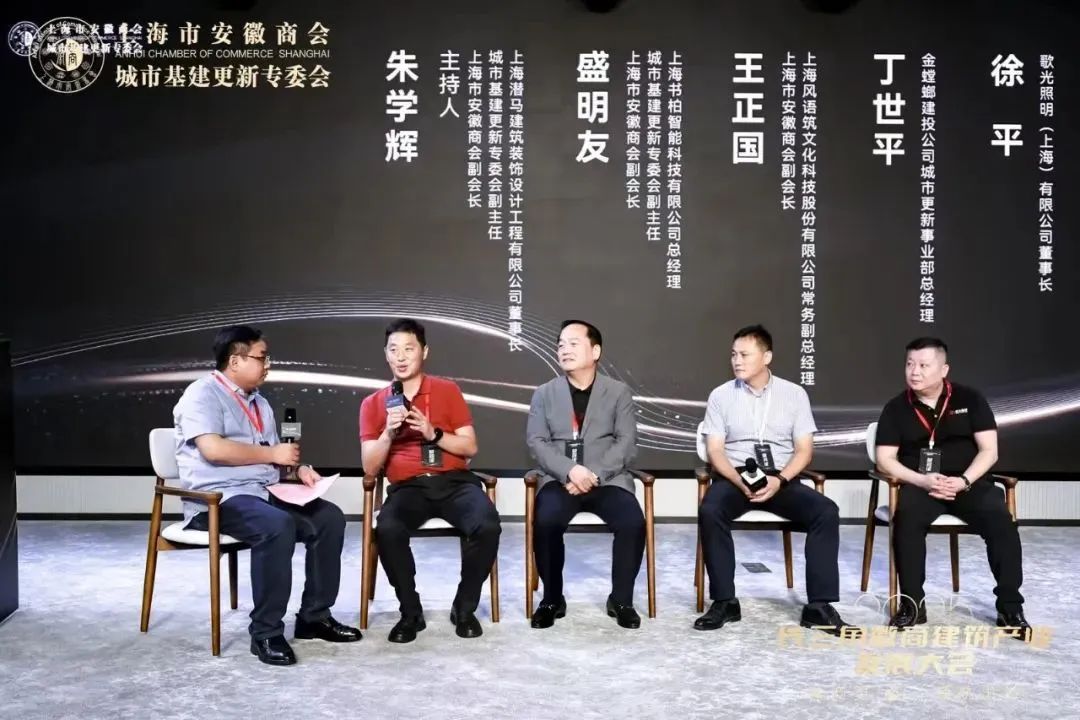
4. Achievement Display and Future Outlook: Building a platform to facilitate the global development of the industry
Standing at the crest of the tide, a thousand sails are strong; riding the waves, all things are renewed. The 2025 Yangtze River Delta Huishang Construction Industry Development Conference is not only a grand gathering of ideas but also a convergence of industrial forces. At present, the country is actively promoting the in-depth implementation of the Belt and Road Initiative, striving to build an all-round, multi-level and wide-ranging pattern of opening up to the outside world, and injecting strong Chinese impetus into the world economic development. This grand strategy not only creates broad opportunities for Chinese enterprises to "go global", but also sketches a magnificent blueprint for global economic cooperation and sustainable development. Jianjing Investment Consulting Co., LTD., with its profound industry accumulation and acute strategic vision, firmly grasps the pulse of The Times and deeply integrates into the national development strategy.
Since its establishment, Jianjing Consulting has always adhered to the concept of "upholding integrity and innovation", and is committed to building a comprehensive engineering consulting service platform. Its business scope is extensive, covering the entire industrial chain including feasibility studies, tendering agency, surveying, planning and design, supervision, cost estimation, project management and international consulting, providing professional intellectual support throughout the entire life cycle for customers. After years of hard work and perseverance, Jianjing Consulting has successfully transformed from a single cost consulting institution into a leading comprehensive engineering consulting enterprise in the industry, establishing an outstanding brand image within the sector.
Facing the major opportunities brought by the national "Belt and Road Initiative", Jianjing Consulting acted promptly and actively engaged in it. Up to now, 1,470 overseas projects have been successfully completed, with project footprints covering 124 countries and regions around the world. Through the implementation of these projects, Jianjing Consulting has accumulated rich international engineering experience and gradually formed the "Jianjing China Solution" with wide influence.
In terms of technological innovation, Jianjing Consulting closely follows the national strategy of achieving self-reliance and self-strengthening in science and technology, and vigorously promotes the deep integration of digital technology and engineering consulting services. The company is actively exploring digitalization and intelligence, innovating business models in numerous fields such as smart buildings, municipal works, transportation, water conservancy, energy, environmental protection, future communities, and rural landscapes. It is transforming from traditional project delivery to digital services, providing a "package" of system solutions, and accurately seizing the strategic development opportunities of the construction engineering industry Internet.
Looking ahead, Jianjing Consulting will continue to be guided by the national strategy, fully leverage its professional advantages in the field of engineering consulting, constantly improve the quality and level of services, and contribute more to promoting the internationalization process of Chinese construction enterprises. Jianjing Consulting will continue to deepen cooperation with countries and regions along the "Belt and Road", actively participate in more major project constructions, contribute to the improvement of local infrastructure and economic development, and further enhance the competitiveness and influence of Chinese construction enterprises in the international market. Under the strong impetus of the national strategy, Jianjing Consulting is bound to brave the wind and waves, sail towards an even more brilliant future, and write a magnificent chapter in the international development of China's engineering consulting industry!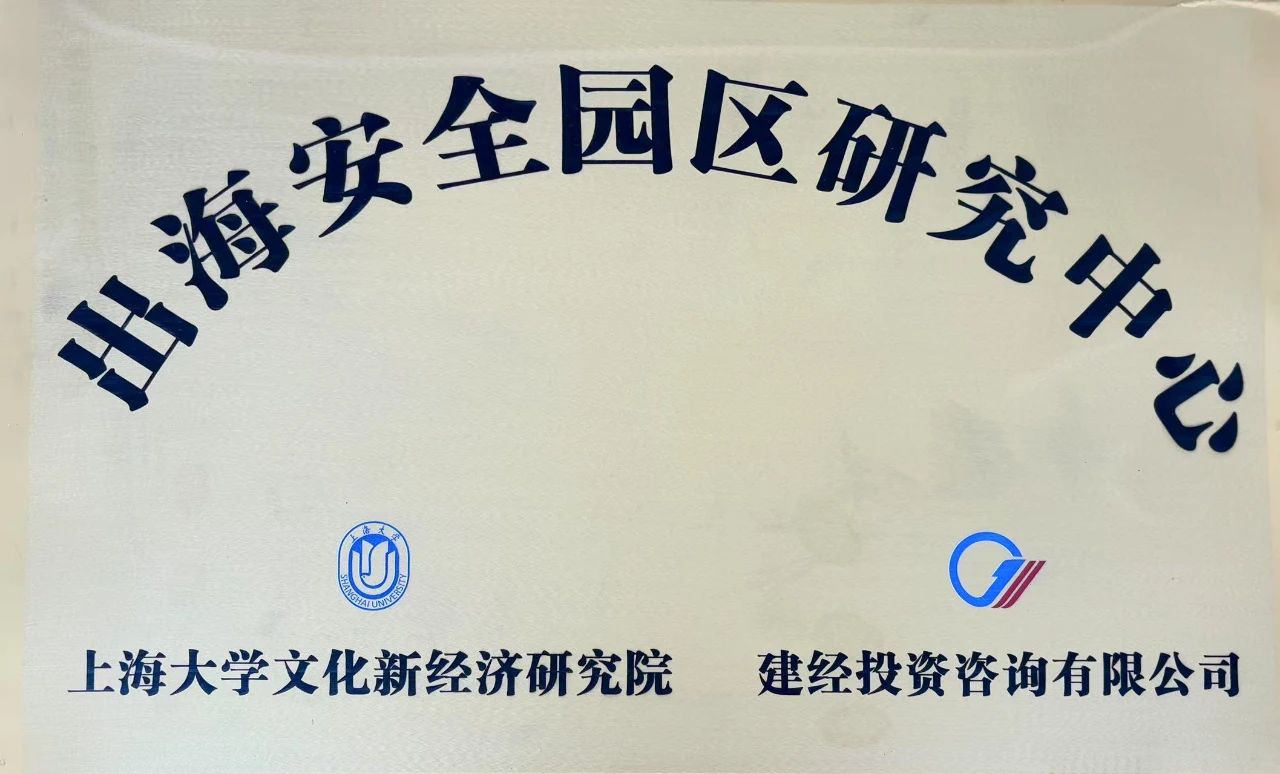
Author:Kevin

We will contact you within 24 hours.